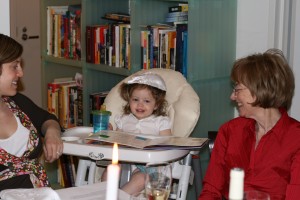 I’ve posted several times on this blog about teaching my 18-month-old daughter Zoe about other cultures through travel, cultural events, art, food and even Tea clothing! But I’ve never written about teaching Zoe about our own culture. Last night we celebrated the Jewish holiday of Passover at our home with 10 other family members.
I’ve posted several times on this blog about teaching my 18-month-old daughter Zoe about other cultures through travel, cultural events, art, food and even Tea clothing! But I’ve never written about teaching Zoe about our own culture. Last night we celebrated the Jewish holiday of Passover at our home with 10 other family members.
Zoe loves to be the center of attention and had the time of her life with 4 admiring grandparents, 1 great-grandmother, 4 aunts and one uncle to entertain. Everyone was eager to teach her about the various customs and traditions of Passover. Last year we also celebrated Passover with Zoe but she was too young to partake in any of the customs.
My mother-in-law gave Zoe a children’s book on Passover with pictures of the different customs. Zoe loved flipping through the book and identifying each item on the table which matched the pictures -the wine cups, the parsley, bowls of salt water and others.
One of Zoe’s favorite parts of the night was searching for the afikomen which is a piece of matza (unleavened bread) wrapped in a cloth. It is traditional for an adult to hide the afikomen and for the kids to look for it. Zoe loves hiding games and we often hide and search for things for fun so this was right up her ally. Because she is so young the hiding spot was pretty basic -under the glass coffee table. Zoe was very proud of herself when she found it and everyone cheered. She was given money for it (as is the tradition) but wasn’t very interested in the money and handed it over to her dad.
Zoe also loved the blessings over the wine because she knows that her tiny silver kiddush cup (which is a traditional religious cup) is always filled with pure (meaning undiluted) white grape juice. Holidays are the only time she gets pure juice so this is always a treat for her.
The realization that Zoe has finally reached an age where she can partake in various rituals and customs and begin to form a sense of her own cultural heritage is exciting! I look forward to years of celebrating holidays and events from our own culture as well as from other cultures.

